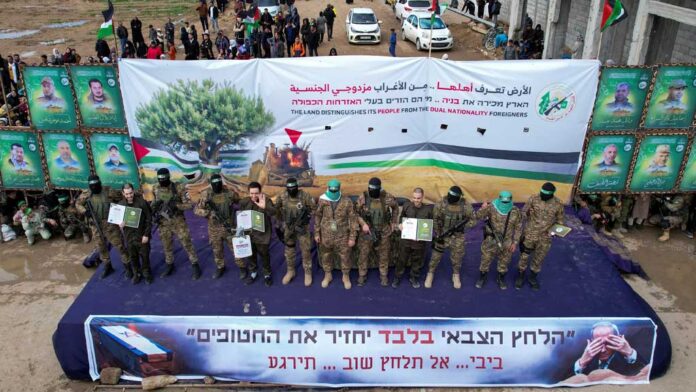Israel announced on Sunday that it was delaying the release of hundreds of Palestinian prisoners scheduled for the previous day, citing unmet conditions by Hamas and highlighting the fragile state of the Gaza ceasefire.
Prime Minister Benjamin Netanyahu’s office stated early Sunday that Israel would hold off on releasing the 620 Palestinian prisoners and detainees “until the release of the next hostages has been assured, and without the humiliating ceremonies.” This referred to recent hostage handovers by Hamas, which U.N. officials criticized for violating international law due to the lack of respect shown during the transfers.
In several instances, Hamas made hostages appear before crowds, sometimes forcing them to speak before being released. Coffins carrying the remains of hostages were also paraded through crowds.
Israel’s announcement, which also accused Hamas of repeated ceasefire violations, came after the militant group handed over six hostages on Saturday as part of the truce agreement. These six hostages were the last living Israeli captives scheduled for release under the first phase of the ceasefire. Four more deceased hostages are expected to be handed over next week, though it remains unclear whether Israel’s delay is tied to that release or future ones.
After the six hostages returned to Israel, Hamas released a video showing two other hostages, Eviatar David and Guy Gilboa-Dalal, observing one of the handovers. Meanwhile, Hamas spokesperson Abdul Latif Al-Qanou accused Israel of breaching the ceasefire by not releasing the Palestinian prisoners as agreed.
Despite ongoing accusations from both sides since the ceasefire began on January 19, the truce has largely held, though Hamas previously threatened to halt hostage releases over alleged Israeli violations.
On Saturday, Hamas handed over hostages Eliya Cohen, 27, Omer Shem Tov, 22, and Omer Wenkert, 23—who were all abducted during Hamas’ October 7, 2023, attack—to the Red Cross in central Gaza. Armed militants guarded the handover, where the visibly thin and pale hostages were made to wave from a stage.
Two other hostages, Tal Shoham, 40, and Avera Mengistu, 39, were released earlier in southern Gaza. Hamas defended its public handover events, calling them a solemn display of Palestinian unity. A sixth hostage, Hisham Al-Sayed, 36, an Arab citizen of Israel, was released to the Red Cross without a public ceremony. Al-Sayed and Mengistu had been held by Hamas for about a decade after entering Gaza voluntarily.
Shoham had been abducted from Kibbutz Be’eri along with his wife and two children, who were released during a brief truce in November 2023. Currently, 63 more hostages remain in Gaza, though less than half are believed to be alive. These hostages are expected to be released under a three-phase ceasefire agreement mediated by Qatar and Egypt.
The return of Omer Shem Tov was particularly emotional, as he hugged his parents while laughing and crying. “How I dreamt of this,” he said in a video shared by the Israeli military.
TALKS ON NEXT PHASE
The delicate ceasefire was further strained by a misidentification incident last Thursday when Hamas returned a body thought to be Shiri Bibas, who was kidnapped with her two sons and husband during the October 2023 attacks. Her family confirmed late Friday that a different body returned by Hamas was indeed hers.
While the ceasefire has temporarily halted fighting, the path to a permanent resolution remains uncertain. Both sides are expected to begin talks on the second phase of the agreement, focusing on releasing the remaining hostages and the full withdrawal of Israeli troops.
The war erupted on October 7, 2023, when Hamas-led militants launched a cross-border attack, killing 1,200 people and taking 251 hostages, according to Israeli sources. In response, Israel launched an extensive military campaign in Gaza, which Palestinian health officials report has killed at least 48,000 people, decimating large parts of the region and leaving hundreds of thousands displaced and reliant on humanitarian aid.



